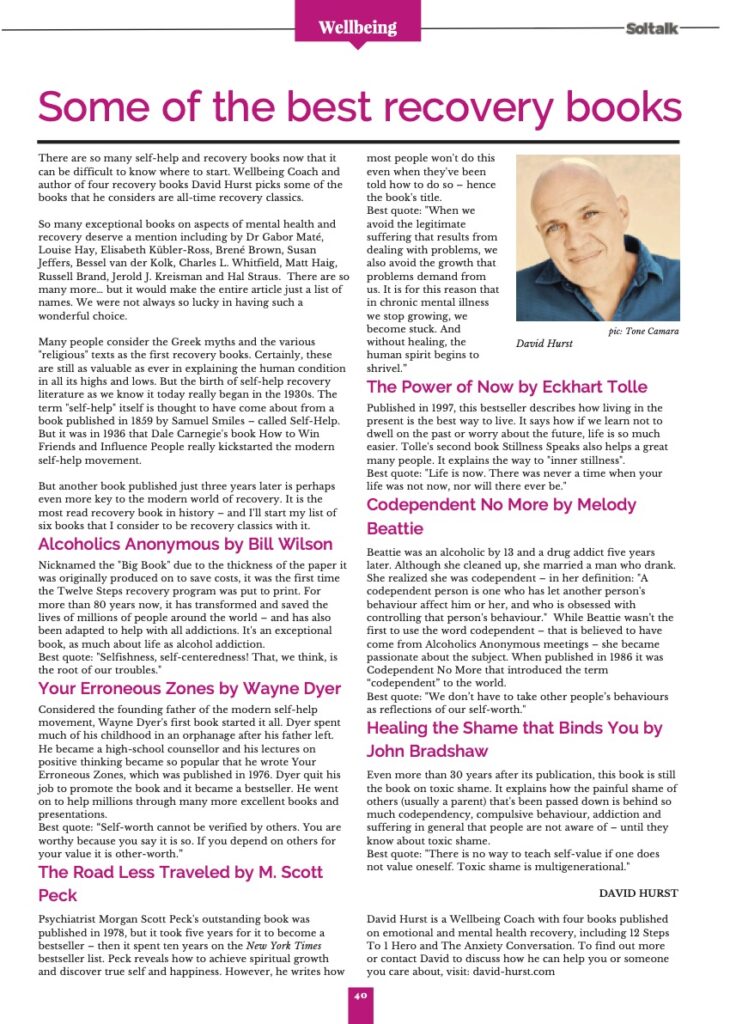What are some of the best recovery books?

There are so many books of self-help and recovery now that it can be difficult to know where to start…
So many exceptional books on aspects of mental health and recovery deserve a mention including by Dr Gabor Maté, Louise Hay, Elisabeth Kübler-Ross, Brené Brown, Susan Jeffers, Bessel van der Kolk, Charles L. Whitfield, Matt Haig, Russell Brand, Jerold J. Kreisman and Hal Straus. There are so many more… but it would make the entire article just a list of names. We were not always so lucky in having such a wonderful choice.
Many people consider the Greek myths and the various “religious” texts as the first recovery books. Certainly, these are still as valuable as ever in explaining the human condition in all its highs and lows. But the birth of self-help recovery literature as we know it today really began in the 1930s. The term “self-help” itself is thought to have come about from a book published in 1859 by Samuel Smiles – called Self-Help. But it was in1936 that Dale Carnegie’s book How to Win Friends and Influence People really kickstarted the modern self-help movement.
But another book published just three years later is perhaps even more key to the modern world of recovery. It is the most read recovery book in history – and I’ll start my list of six books that I consider to be recovery classics with it.
Alcoholics Anonymous by Bill Wilson
Nicknamed the “Big Book” due to the paper’s thickness it was originally produced on to save costs, it was the first time the Twelve Steps recovery program was put to print. For more than 80 years now, it has transformed and saved the lives of millions of people around the world – and has also been adapted to help with all addictions. It’s an exceptional book, as much about life as alcohol addiction.
Best quote: “Selfishness, self-centeredness! That, we think, is the root of our troubles.”
Your Erroneous Zones by Wayne Dyer
Considered the founding father of the modern self-help movement, Wayne Dyer’s first book started it all. Dyer spent much of his childhood in an orphanage after his father left. He became a high-school counsellor and his lectures on positive thinking became so popular that he wrote Your Erroneous Zones, which was published in 1976.Dyer quit his job to promote the book and it became a bestseller. He went on to help millions through many more excellent books and presentations.
Best quote: “Self-worth cannot be verified by others. You are worthy because you say it is so. If you depend on others for your value it is other-worth.”
The Road Less Traveled by M. Scott Peck
Psychiatrist Morgan Scott Peck’s outstanding book was published in 1978, but it took five years for it to become a bestseller – then it spent ten years on the New York Times bestseller list. Peck reveals how to achieve spiritual growth and discover true self and happiness. However, he writes how most people won’t do this even when they’ve been told how to do so – hence the book’s title.
Best quote: “When we avoid the legitimate suffering that results from dealing with problems, we also avoid the growth that problems demand from us. It is for this reason that in chronic mental illness we stop growing, we become stuck. And without healing, the human spirit begins to shrivel.”
The Power of Now by Eckhart Tolle
Published in 1997, this bestseller describes how living in the present is the best way to live. It says how if we learn not to dwell on the past or worry about the future, life is so much easier. Tolle’s second book Stillness Speaks also helps a great many people. It explains the way to “inner stillness”.
Best quote: “Life is now. There was never a time when your life was not now, nor will there ever be.”
Codependent No More by Melody Beattie
Beattie was an alcoholic by 13 and a drug addict five years later. Although she cleaned up, she married a man who drank. She realized she was codependent – in her definition: “A codependent person is one who has let another person’s behaviour affect him or her, and who is obsessed with controlling that person’s behaviour.” While Beattie didn’t first use the word codependent – that is believed to have come from Alcoholics Anonymous meetings – she became passionate about the subject. When published in 1986 it was Codependent No More thatintroduced the term “codependent” to the world.
Best quote: “We don’t have to take other people’s behaviours as reflections of our self-worth.”
Healing the Shame that Binds You by John Bradshaw
Even more than 30 years after its publication, this book is still the book on toxic shame. It explains how the painful shame of others (usually a parent) that’s been passed down is behind so much codependency, compulsive behaviour, addiction and suffering in general that people are not aware of – until they know about toxic shame.
Best quote: “There is no way to teach self-value if one does not value oneself. Toxic shame is multigenerational.”
My article for Soltalk magazine.

